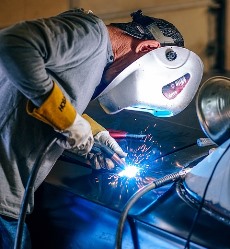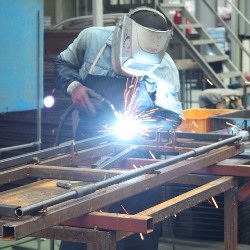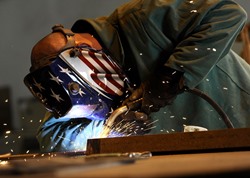How to Pick the Right Welding Certification Class near Union New Hampshire
 Selecting the right welder school near Union NH is an essential first step to starting your new occupation as a professional welder. But since there are so many schools to select from, how do you know which ones to consider? And more significantly, once you have narrowed down your choices, how do you pick the best one? A number of people start by looking at the schools that are closest to their homes. When they have located those that are within driving distance, they are drawn toward the least expensive one. Yes, location and the cost of tuition are crucial issues when evaluating welding trade schools, but they are not the only ones. Other concerns include such things as accreditation, reputation and job placement rates. So before beginning your search for a trade school to become a welder, it’s wise to create a list of qualifications that your chosen school must have. But before we delve into our due diligence checklist, let’s talk a little bit about how to become a welder.
Selecting the right welder school near Union NH is an essential first step to starting your new occupation as a professional welder. But since there are so many schools to select from, how do you know which ones to consider? And more significantly, once you have narrowed down your choices, how do you pick the best one? A number of people start by looking at the schools that are closest to their homes. When they have located those that are within driving distance, they are drawn toward the least expensive one. Yes, location and the cost of tuition are crucial issues when evaluating welding trade schools, but they are not the only ones. Other concerns include such things as accreditation, reputation and job placement rates. So before beginning your search for a trade school to become a welder, it’s wise to create a list of qualifications that your chosen school must have. But before we delve into our due diligence checklist, let’s talk a little bit about how to become a welder.
Welding Degree and Certificate Training Courses
 There are several alternatives available to obtain training as a welder in a trade or vocational school. You can obtain a a certificate, a diploma or an Associate Degree. Bachelor Degrees are available in Welding Engineering or Welding Technology, but are more advanced courses than most journeyman welders will need. Some programs are also offered in conjunction with an apprenticeship program. Following are short summaries of the most typical welding programs offered in the Union NH.
There are several alternatives available to obtain training as a welder in a trade or vocational school. You can obtain a a certificate, a diploma or an Associate Degree. Bachelor Degrees are available in Welding Engineering or Welding Technology, but are more advanced courses than most journeyman welders will need. Some programs are also offered in conjunction with an apprenticeship program. Following are short summaries of the most typical welding programs offered in the Union NH.
- Certificate and Diploma Programs are normally offered by technical and trade schools and take about a year to finish. They are more hands-on training in scope, created largely to teach welding skills. They can provide a good foundation for a new journeyman or apprentice welder, or specialized skills for working welders.
- Associate Degree Programs will take 2 years to finish and are most often offered by community colleges. An Associate Degree in Welding Technology offers a more extensive education than the diploma or certificate while still supplying the foundation that readies students to enter the workforce.
A number of municipalities and states do have licensing prerequisites for welders, therefore make sure to check for your location of future employment. If required, the welding school you choose should prep you for any licensing examinations that you will have to take in addition to providing the appropriate training to become a professional welder.
Welding Certification Alternatives
 There are multiple organizations that offer welder certifications, which test the skill level and knowledge of those applying. A large number of Union NH employers not only demand a degree or certificate from an accredited welding program, but also certification from a respected agency like the American Welding Society (AWS). A variety of certifications are available based on the type of work that the welder does. Just some of the things that certification can acknowledge are the welder’s ability to
There are multiple organizations that offer welder certifications, which test the skill level and knowledge of those applying. A large number of Union NH employers not only demand a degree or certificate from an accredited welding program, but also certification from a respected agency like the American Welding Society (AWS). A variety of certifications are available based on the type of work that the welder does. Just some of the things that certification can acknowledge are the welder’s ability to
- Work in compliance with specific codes
- Work with certain metal thicknesses
- Work with specific types of welds
- Work according to contract specifications
As previously stated, many states, cities or local municipalities have licensing requirements for welders. Of those requiring licensing, some also require certification for various types of work. Certification is also a means to prove to employers that you are an exceptionally skilled and experienced welder. So similarly as with licensing, check the requirements for your location and make sure that the welding technical school you choose readies you for certification if needed.
Subjects to Ask Welder Tech Schools
 As soon as you have chosen the credential you want to obtain, a diploma, certificate or degree, you can start to assess schools. As you can imagine, there are a large number of welder trade and technical schools in the Union NH area. That’s why it’s necessary to establish in advance what qualifications your chosen school must have. We have previously discussed 2 significant ones that many people consider first, which are location and the cost of tuition. As stated, although they are very important qualifications, they are not the only ones that must be considered. After all, the program you pick is going to provide the education that will be the foundation of your new vocation as a welder. So following are more factors you might want to evaluate before selecting a welding technical school.
As soon as you have chosen the credential you want to obtain, a diploma, certificate or degree, you can start to assess schools. As you can imagine, there are a large number of welder trade and technical schools in the Union NH area. That’s why it’s necessary to establish in advance what qualifications your chosen school must have. We have previously discussed 2 significant ones that many people consider first, which are location and the cost of tuition. As stated, although they are very important qualifications, they are not the only ones that must be considered. After all, the program you pick is going to provide the education that will be the foundation of your new vocation as a welder. So following are more factors you might want to evaluate before selecting a welding technical school.
Accreditation. It’s essential that the welding vocational school you choose is accredited by either a national or a regional agency. There are 2 standard types of accreditation. The school may earn Institutional Accreditation based on all of their programs. Programmatic Accreditation is based on a specific program the school offers, such as Welding Technology. So confirm that the program you select is accredited, not just the school alone. Additionally, the accreditation should be by a U.S. Department of Education recognized accrediting organization, such as the Accrediting Commission of Career Schools and Colleges of Technology (ACCSCT). In addition to helping make sure that you get a quality education, the accreditation may also assist in getting financial assistance or student loans, which are in many cases unavailable in Union NH for schools that are not accredited. Finally, for those states or municipalities that require licensing, they may require that the welder training program be accredited as well.
Apprenticeship and Job Placement Programs. Many welder degree or certificate programs are offered combined with an apprenticeship program. Various other schools will assist in placing you in a job or an apprenticeship after graduation. Ask if the schools you are considering assist in placing students in apprenticeships or have a job assistance program. These schools must have relationships with local unions and other metal working businesses to which they can place their students. Older schools may have a larger network of graduates that they can rely upon for placements. These programs can assist students in finding employment and establish associations within the Union NH welding community.
Job Placement and Completion Rates. The completion rate is the portion or percentage of students that enroll in an educational program and complete it. It’s essential that the welding program you choose has a higher completion rate. A low rate could signify that the students who joined the program were unhappy with the instruction, the teachers, or the facilities, and dropped out. The job placement rate is also an indication of the caliber of training. A high job placement rate will not only affirm that the school has a good reputation within the field, but additionally that it has the network of Union NH contacts to assist students obtain employment or apprenticeships after graduation.
Up-to-date Equipment and Facilities. After you have limited your choice of welding programs to two or three options, you should consider visiting the campuses to inspect their facilities. Confirm that both the facilities and the equipment that you will be instructed on are up-to-date. Specifically, the training equipment should be similar to what you will be using on the job. If you are not sure what to look for, and are already in an apprenticeship program, consult with the master welder you are working under for guidance. Otherwise, ask a local Union NH welding contractor if they can give you a few tips.
School Location. Although we already briefly covered the relevance of location, there are a few additional issues that we should deal with. You should remember that unless you are able to relocate, the welding school you pick needs to be within commuting distance of your Union NH home. If you do opt to attend an out-of-state school, besides relocation costs there could be higher tuition fees for out-of-state residents. This is particularly true for welder diploma programs offered by community colleges. Additionally, if the school provides a job placement or apprenticeship program, most likely their placements are within the school’s regional community. So the location of the school needs to be in a region or state where you subsequently will desire to work.
Smaller Classes. One-on-one instruction is essential for a hands-on trade such as welding. It’s easy to be overlooked in larger classes and not obtain much individualized instruction. Ask what the average class size is for the welding schools you are reviewing. Ask if you can sit in on some classes so that you can experience just how much individual attention the students are receiving. While there, talk with a few of the students and get their evaluations. Similarly, talk with a few of the instructors and find out what their welding experience has been and what certifications and credentials they hold.
Convenient Class Schedules. Lots of folks learn a new trade while still employed at their current job. Check to see that the class schedules for the programs you are reviewing are convenient enough to fulfill your needs. If you can only attend classes at night or on weekends near Union NH, make sure that the schools you are looking at offer those options. If you can only enroll on a part-time basis, make sure that the school you select offers part-time enrollment. Also, check to see what the policy is to make up classes if you you miss any because of work, illness or family circumstances.
Online Welding Training
 Welding is truly a hands-on kind of vocation, and therefore not extremely suitable for training online. However, there are a small number of online welding programs offered by certain community colleges and vocational schools in the greater Union NH area that may be credited toward a certificate or degree program. These courses primarily deal with such topics as safety, reading blueprints, and metallurgy. They can help give a beginner a basis to begin their education and training. Nevertheless, the most important point is that you can’t learn how to weld or work with welding materials until you actually do it. Naturally that can’t be done online. These skills must be learned in an on-campus environment or in an apprenticeship. Online or distance learning is better suited for experienced welders that want to advance their knowledge or possibly earn a more advanced degree. So if you should find an online welding degree or certificate program, be extremely cautious and verify that the bulk of the training is done on campus or in a workshop type of environment.
Welding is truly a hands-on kind of vocation, and therefore not extremely suitable for training online. However, there are a small number of online welding programs offered by certain community colleges and vocational schools in the greater Union NH area that may be credited toward a certificate or degree program. These courses primarily deal with such topics as safety, reading blueprints, and metallurgy. They can help give a beginner a basis to begin their education and training. Nevertheless, the most important point is that you can’t learn how to weld or work with welding materials until you actually do it. Naturally that can’t be done online. These skills must be learned in an on-campus environment or in an apprenticeship. Online or distance learning is better suited for experienced welders that want to advance their knowledge or possibly earn a more advanced degree. So if you should find an online welding degree or certificate program, be extremely cautious and verify that the bulk of the training is done on campus or in a workshop type of environment.
Attending a Welding School in Union NH?
If you have decided to enroll in a welder training program in the Union New Hampshire area, you may find the following information both informative and helpful about the location of your new school campus.
Union, New Hampshire
Union is in the southern corner of the town of Wakefield, along the Branch River, a tributary of the Salmon Falls River. It is bordered to the west by the town of Middleton and to the southeast by the town of Milton, both in Strafford County. New Hampshire Route 16 forms the northeastern edge of the CDP; the highway leads north 16 miles (26 km) to Ossipee and south 15 miles (24 km) to Rochester. New Hampshire Route 153 passes through the northern part of the village, leading north 4.5 miles (7.2 km) to Sanbornville and southwest 8 miles (13 km) to Farmington. New Hampshire Route 125 has its northern terminus in Union at Route 153, and leads southeast 5 miles (8 km) to Milton.
As of the census of 2010, there were 204 people, 84 households, and 56 families residing in the CDP. There were 93 housing units, of which 9, or 9.7%, were vacant. The racial makeup of the CDP was 98.5% white, 0.5% Native American and 1.0% "some other race". 1.0% of the population were Hispanic or Latino of any race.[2]
Of the 84 households in the CDP, 25.0% had children under the age of 18 living with them, 47.6% were headed by married couples living together, 14.3% had a female householder with no husband present, and 33.3% were non-families. 21.4% of all households were made up of individuals, and 11.9% were someone living alone who was 65 years of age or older. The average household size was 2.43, and the average family size was 2.82.[2]
Find the Right Welding Trade School Union NH
Selecting the ideal welding school will probably be the most important decision you will make to begin your new profession. You originally stopped by our website because you had an interest in Degree In Welding. However, as we have discussed in this article, there are a number of things that you will need to assess and compare among the schools you are reviewing. It’s a prerequisite that any welding training that you are examining includes a considerable amount of hands-on training. Classes should be small in size and every student must have their own welding machine to train with. Classroom education should offer a real-world frame of reference, and the training program should be up-to-date and in-line with industry standards. Training programs vary in duration and the kind of credential provided, so you will have to ascertain what length of program and certificate or degree will best serve your needs. Every training program offers different options for certification as well. Probably The ideal approach to research your final list of schools is to visit each campus and speak with the teachers and students. Invest some time to sit in on a few classes. Inspect the campus and facilities. Make sure that you are confident that the training program you choose is the ideal one for you. With the proper training, hard work and commitment, the final outcome will be a new trade as a professional welder in Union NH.
